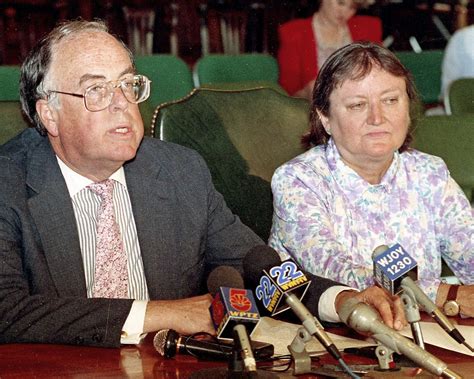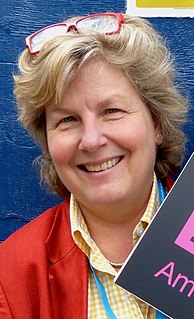A Quote by Margaret Thatcher
Why in the world anyone in America is allowing another language (other than English) to be his first... I don't know
Related Quotes
I have a funny relationship to language. When I came to California when I was three I spoke Urdu fluently and I didn't speak a word of English. Within a few months I lost all my Urdu and spoke only English and then I learned Urdu all over again when I was nine. Urdu is my first language but it's not as good as my English and it's sort of become my third language. English is my best language but was the second language I learned.
James Joyce's English was based on the rhythm of the Irish language. He wrote things that shocked English language speakers but he was thinking in Gaelic. I've sung songs that if they were in English, would have been banned too. The psyche of the Irish language is completely different to the English-speaking world.
I found cause to wonder upon what ground the English accuse Americans of corrupting the language by introducing slang words. I think I heard more and more different kinds of slang during my few weeks' stay in London than in my whole "tenderloin" life in New York. But I suppose the English feel that the language is theirs, and that they may do with it as they please without at the same time allowing that privilege to others.
The fact that for a long time Cubism has not been understood and that even today there are people who cannot see anything in it means nothing. I do not read English, an English book is a blank book to me. This does not mean that the English language does not exist. Why should I blame anyone but myself if I cannot understand what I know nothing about?" -Pablo Picasso.
What does purpose mean? It means the deepest desire for our short lives to mean something. . . . To speak a language of purpose is to return to first principles and to be able to answer, in plain English, the plain questions of Why? Why should we chip in to help someone else? Why should we defer gratification? Why should we care about the long term? Why should we trust anyone who seems to be limiting our ability to do what we want?
Here's a strange fact: murder a man, and you feel responsible for his life - ''possessive'', even. You know more about him than his father and mother; they knew his fetus, but you know his corpse. Only you can complete the story of his life, only you know why his body has to be pushed into the fire before its time, and why his toes curl up and fight for another hour on earth.
Malcolm Bradbury made the point, and I don't know whether it's a valid one or not, that the real English at the moment is not the English spoken in England or in America or even in Canada or Australia or New Zealand. The real English is the English which is a second language, so that it's rather like Latin in the days of the Roman Empire when people had their own languages, but had Latin in order to communicate.
We do not for example say that the person has a perfect knowledge of some language L similar to English but still different from it. What we say is that the child or foreigner has a 'partial knowledge of English' or is 'on his or her way' towards acquiring knowledge of English, and if they reach this goal, they will then know English.
Our children learn the phonetic method, which is why they're very good spellers, I suppose. Because rather than ABC or just saying a word, they'll have to go a as in apple and all the other a's there are in the English language. They learn that when they're four. Children all over America can tell you that a, e, i, o, u, and sometimes y are vowels. But you ask them about that "sometimes y," and they can't tell you.










































